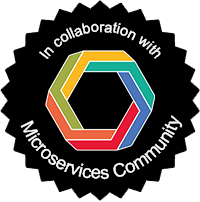Program
June 13th - Single session from 13:30 to 17:05 CEST (Venue)
|
13:30 13:35 |
Opening
Chairs: Florian Rademacher (University of Applied Sciences and Arts Dortmund), Eduardo Guerra (Free University of Bozen-Bolzano), and Larisa Safina (INRIA Lille - Nord Europe) The chairs welcome all attendees at AMP 2022 and provide information on the organisation of the event. |
|
13:35 14:30 |
Keynote - Microservice Architecture Recovery
Speaker: Nour Ali Software Architecture Recovery (or architecture reconstruction) is a reverse engineering technique which obtains a software architecture representation of an implemented system. Over the last 20 years, Architecture Recovery has supported the understanding, maintenance, and evolution of systems. With the emergence and popularity of Microservice Architecture, an architectural style characterised with continuous delivery and an evolutionary architecture, many argue whether architecture recovery is essential. In this talk, Nour will argue the need to obtain a holistic view of the architecture for microservice systems through architecture recovery. She will also introduce you how they have designed and developed the Microservice Architecture Recovery (MiSAR) approach and share with you their experiences and evaluations. Dr Nour Ali is a Senior Lecturer at Brunel University London and co-leads the Brunel Software Engineering (BSEL) group. She received her Computer Science degree from Bir-Zeit University-Palestine and holds a PhD in Software Engineering from Universidad Politecnica de Valencia-Spain. She has been Principal Investigator and member of research and knowledge transfer projects. Her research focuses on developing software architecture techniques, methods and tools and applying them to different challenging systems and situations such as distributed, mobile and adaptive. Her personal website is: [https://www.brunel.ac.uk/people/nour-ali](https://www.brunel.ac.uk/people/nour-ali) |
|
14:35 14:55 |
 Iterative and Incremental Refinement of Microservice-based Architectures and SLOs
Iterative and Incremental Refinement of Microservice-based Architectures and SLOs
Authors: Sandro Speth, Sarah Stieß, Sebastian Frank and Steffen Becker In an agile development process, non-functional requirements and software architectures continuously change, making it hard to extract and manage appropriate Service Level Objectives (SLO). We propose an interactive toolchain to support the architect in iteratively and incrementally adapting SLOs and architecture alongside each other. Our toolchain utilises the results of experiments and SLO violation impact analyses to guide the architect's adaptation decisions, reflecting continuously changing and imprecise requirements. Prototypes of the presented tools already exist. In this paper, we envision their interconnection and required extensions. |
|
15:00 15:30 |
Break
|
|
15:30 16:00 |
Towards an Architecture-centric Methodology for Migrating to Microservices
Authors: Jonas Fritzsch, Justus Bogner, Markus Haug, Stefan Wagner and Alfred Zimmermann The euphoria around microservices has decreased over the years, but the trend of modernizing legacy systems to this novel architectural style is unbroken to date. A variety of approaches have been proposed in academia and industry, aiming to structure and automate the often long-lasting and cost-intensive migration journey. However, our research shows that there is still a need for more systematic guidance. While grey literature is dominant for knowledge exchange among practitioners, academia has contributed a significant body of knowledge as well, catching up on its initial neglect. A vast number of studies on the topic yielded novel techniques, often backed by industry evaluations. However, practitioners hardly leverage these resources. In this paper, we report on our efforts to design an architecture-centric methodology for migrating to microservices. As its main contribution, a framework provides guidance for architects during the three phases of a migration. We refer to methods, techniques, and approaches based on a variety of scientific studies that have not been made available in a similarly comprehensible manner before. Through an accompanying tool to be developed, architects will be in a position to systematically plan their migration, make better informed decisions, and use the most appropriate techniques and tools to transition their systems to microservices. |
|
16:05 16:35 |
Improving the implementation of microservice-based systems with static code analysis
Authors: Sebastian Copei, Maximilian Schreiter and Albert Zündorf IDE’s (Integrated Development Environments) are powerful tools to support the development process and helps to write better and cleaner code. However, the most IDE’s aiming with their support on the development of monolithic software. For the development of distributed systems like a microservices-based system, there is a lack of IDE support for e.g. inter-service communication via REST. In depth, this means through the string-based communication used during REST, the IDE is not able to support with autocompletion, syntax highlighting or type checking. To solve this issue, we come up with an IDE plugin, based on the LSP (Language Server Protocol), which gives additional support during the development of distributed microservice-based systems, in a monorepo environment. |
|
16:40 17:00 |
Towards Semi-Automated Viewpoint-Based Reconstruction of Microservice Architecture
Authors: Philip Wizenty and Sabine Sachweh Microservice Architecture (MSA) is an approach to realizing service-based software systems that fosters the modifiability of the underlying architectures. However, the resulting flexibility increase also bears a greater risk for the erosion of anticipated architecture designs, e.g., because teams are comparatively free in certain architecture-related decisions like the provisioning of new microservices or the adaption of existing ones. The increased risk for architecture design erosion calls for new techniques to support MSA stakeholders in (i) assessing the degree of conformance between the anticipated and actual architecture design; and (ii) finding answers to hypotheses about the current architecture. In this paper, we present a novel approach to the semi-automated reconstruction of microservice architectures based on static code analysis. Specifically, our approach leverages Model-driven Engineering to cluster reconstruction information in stakeholder-oriented architecture views, thereby fostering their comprehension and subsequent analysis. |
|
17:00 17:05 |
Closing
Chairs: Florian Rademacher (University of Applied Sciences and Arts Dortmund), Eduardo Guerra (Free University of Bozen-Bolzano), and Larisa Safina (INRIA Lille - Nord Europe) The chairs close the AMP workshop. |

